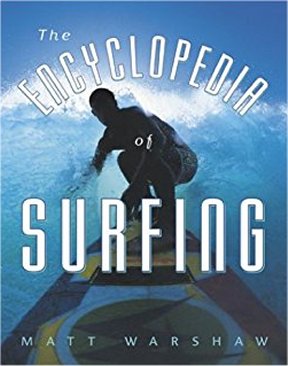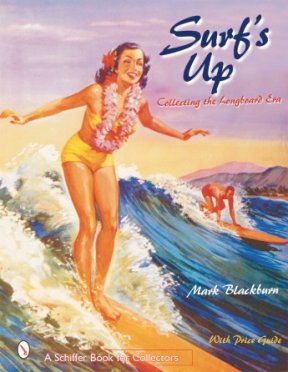|
Surf's Up!by Craig Stark 14 January 2018 |
Approaching a Bookselling Specialty
Confession: I have never in my life been on a surf board, but surfing has always intrigued me, and somewhere along the way it's become one of my cluster of bookselling specialties.
Perhaps being born in California has had something to do with it, but I know there's more to it than that. In his introduction to 200 Years of Surfing Literature: An Annotated Bibliography,
Steve Pezman captures some of the mystique of early surfing:
" ... the numbers of surfers grew increasingly noticeable. But even as our numbers grew, the ride itself remained an intangible. Riding waves left no trace, produced no result, and
depleted nothing. Our wake disappeared behind us. Our footprints were washed from the sand. No residue of value from what we did was left to prove it ever happened. Surfers held significant
rides in their memories and sometimes stories of particularly epic days were passed down via oral history, until they too finally faded away."
In fishing terms, this has a one-that-got-away feel to it in the sense that great early rides were not only ephemeral - that is, short-lived and never recorded - but also, perhaps, never
even observed by others. And you couldn't bring the "fish" home as proof it happened. It wasn't until the 1930's that a measurable number of magazine articles and books about the sport appeared,
and of course there was a boom in the 1960's, triggered in large part by the release of a movie well known to most of us - Gidget. And, by the way, the book of the same name that was its
basis today sells for hundreds of dollars in its first printing state. Many movies followed as well as magazines and books from this era, and now are generally collectible.
My approach to this specialty was by no means a formal one. In my visits to estate sales I picked up surfing books, almost always, and began looking for inventory online as well - venues
including eBay and some mid-range auction houses. There were several disadvantages to this. I knew little about the history of surfing, I only knew a few of the major players, my knowledge
of what was collectible and what wasn't grew only slowly and my surfing vocabulary was not extensive - oh, and early on I had no bibliographies or other reference books. But this is what
happens when you depend only on buying and selling to educate yourself. It's a slow process at best, incomplete at worst. And if you're going to specialize, savvy buyers are going to
quickly discover whether or not you know your stuff, and there will be consequences in the form of fewer sales and lower outcomes if you don't.
As I started to think about this some, I looked at my surfing reference library to review what I'd accumulated over the years - a staggering total of four books. This might not sound
like much, but each book serves an important and pretty much distinct purpose, and together they fulfill my needs in all but the most unusual circumstances. It also occurred to me that
what types of books these were had a more general applicability to specializing in most areas of bookselling. If you've already begun to specialize in a genre or are still in the
mulling-it-over stage, there's a good chance you already have some knowledge of it, perhaps more, but nobody can know it all, and the learning never ends.
In recent years surfing reference books have truly proliferated, so there's much to choose from. However, this can be simplified greatly by dividing them into four more or less basic
categories and offering a examples of what I consider to be some of the best ones.
Bibliographies
If available, first and foremost a good bibliography is essential. It identifies important material and assists in nailing down issue points, sometimes offering indications of scarcity;
and occasionally there is commentary on why an item is of interest - and we know how important this can be. Timothy De La Vega's 200 Years of Surfing Literature: An Annotated Bibliography
has been the standard surfing bibliography for some years now. And, actually, the only one of note. Since collectible surfing publications often manifest in the non-book form of
magazines, ephemera, etc., this bibliography is especially useful because it includes them. Lots of illustrative content as well. My copy is starting to fall apart!
Histories
Here's where knowing your stuff truly comes into play. If you have a command of your specialty, historically speaking, it becomes much easier to maximize your outcomes when offering
material for sale. Potential buyers may or may not be knowledgeable about what you're putting out there, and, if not, it's your job to educate them. Skimp on this at your peril. One of
the best surfing histories, penned by a former editor of Surfer magazine, is Matt Warshaw's The History of Surfing. Nearly 500 pages strong and fully indexed, this book will
get you up to speed.
Encyclopedias
As a sport, surfing is long on terminology, and it's vitally important that you can talk the talk. An encyclopedia is thus invaluable. Here's another important and massive Matt Warshaw
publication: The Encyclopedia of Surfing. It includes not only terminology but numerous biographical entries pertaining to the major surfing players as well. One of the
true legends:
Collectibles
Finally, I discovered long ago that not limiting myself to print material in a specialty was potentially very profitable. You might not want to put yourself in the position of having to
ship collectible surf boards, let alone store them, but there are plenty of other surfing collectibles out there that are more manageable. To this purpose, Mark Blackburn's Surf's Up:
Collecting the Longboard Era is an excellent resource for identifying what's worth bothering with. It's unusually strong in illustrative content and is useful as a comparative pricing guide.
If I may offer some simple advice on specializing, pick something that both interests you and will sell. Funny thing, as many surfing books as I've purchased over the years, I've never
been able to maintain much of a surfing inventory. The reason is simple: They sell - and usually sell quickly. This is key to sustaining your business.
< to previous article
to previous feature article >




Questions or comments?
Contact the editor, Craig Stark
editor@bookthink.com
















